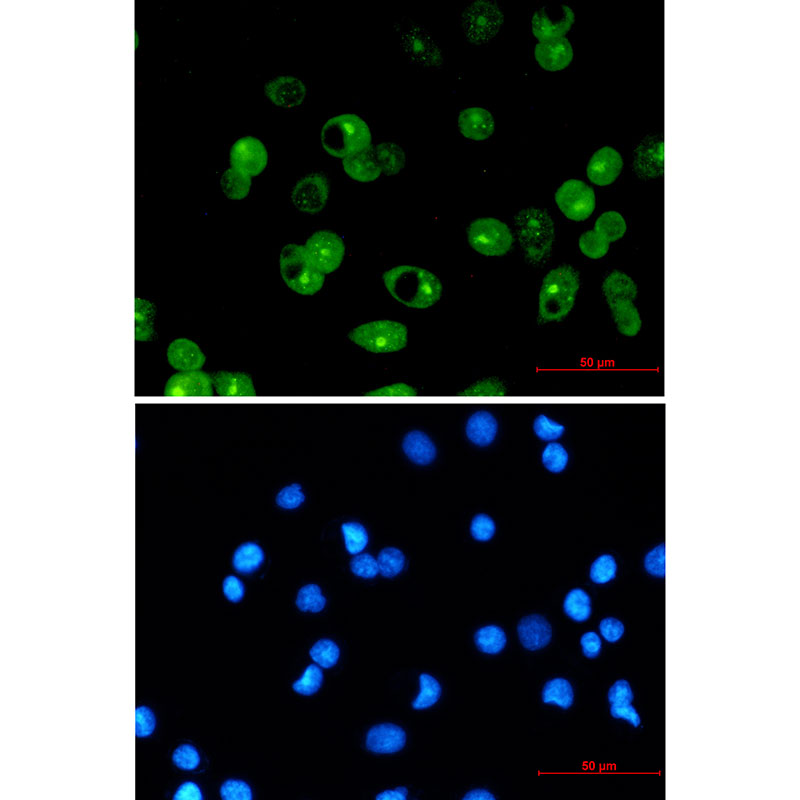

| WB | 1/500-1/1000 | Human,Mouse,Rat |
| IF | 1/20 | Human,Mouse,Rat |
| IHC | 咨询技术 | Human,Mouse,Rat |
| ICC | 1/50-1/200 | Human,Mouse,Rat |
| FCM | 咨询技术 | Human,Mouse,Rat |
| Elisa | 咨询技术 | Human,Mouse,Rat |
| Aliases | MCL1; BCL2L3; Induced myeloid leukemia cell differentiation protein Mcl-1; Bcl-2-like protein 3; Bcl2-L-3; Bcl-2-related protein EAT/mcl1; mcl1/EAT |
| Entrez GeneID | 4170 |
| WB Predicted band size | Calculated MW: 37 kDa; Observed MW: 40 kDa |
| Host/Isotype | Rabbit IgG |
| Antibody Type | Primary antibody |
| Storage | Store at 4°C short term. Aliquot and store at -20°C long term. Avoid freeze/thaw cycles. |
| Species Reactivity | Human,Rat |
| Immunogen | A synthetic peptide of human MCL1 |
| Formulation | Purified antibody in TBS with 0.05% sodium azide,0.05%BSA and 50% glycerol. |
+ +
以下是3篇关于MCL1抗体的代表性文献信息(基于公开研究整理):
---
1. **文献名称**:*Selective MCL1 inhibitor disrupts mitochondrial homeostasis and induces apoptosis in hematologic malignancies*
**作者**:Kotschy A. et al.
**摘要**:该研究报道了一种选择性MCL1小分子抑制剂S63845的开发,通过结合MCL1的BH3结构域破坏其与促凋亡蛋白的相互作用,在多种血液肿瘤模型中诱导癌细胞凋亡,为靶向MCL1的治疗策略提供依据。
---
2. **文献名称**:*MCL1 antibodies for immunohistochemical detection: comparative analysis across cancer types*
**作者**:Zhang H. et al.
**摘要**:作者系统评估了多种商业化MCL1抗体在组织样本中的特异性与敏感性,发现克隆D2W9E在乳腺癌和肺癌中表现出高可靠性,强调了抗体选择对临床病理诊断的重要性。
---
3. **文献名称**:*Structural basis of MCL1 ubiquitination in apoptosis regulation*
**作者**:Lee T. et al.
**摘要**:通过冷冻电镜解析MCL1与E3连接酶复合物的结构,揭示了MCL1降解的分子机制,为设计增强其降解的治疗性抗体或PROTAC分子提供了结构基础。
---
**说明**:上述文献方向覆盖抑制剂开发、诊断抗体评估及结构机制研究。若需具体文献链接或补充,建议通过PubMed搜索关键词(如MCL1 antibody、MCL1 inhibitor)获取最新进展。
MCL1 (Myeloid Cell Leukemia 1) is an anti-apoptotic protein belonging to the BCL-2 family, critical for regulating mitochondrial apoptosis by inhibiting pro-death proteins like BAX and BAK. It plays a key role in cell survival, development, and tissue homeostasis. Dysregulation of MCL1. particularly its overexpression, is frequently linked to cancer progression, therapy resistance, and poor prognosis in various malignancies, including hematologic cancers and solid tumors.
MCL1 antibodies are tools developed to study or therapeutically target this protein. In research, they are used to detect MCL1 expression levels, assess its interaction with binding partners, or evaluate its role in apoptotic pathways. Therapeutically, MCL1-targeting antibodies and antibody-drug conjugates (ADCs) are explored to inhibit its pro-survival function, often in combination with other treatments. Small-molecule inhibitors (e.g., S63845) and BH3 mimetics also aim to block MCL1. but antibody-based agents offer advantages in specificity and reduced off-target effects.
Challenges include MCL1's short half-life, compensatory mechanisms in cancer cells, and on-target toxicity risks (e.g., cardiac issues). Ongoing research focuses on optimizing delivery, identifying predictive biomarkers, and combining MCL1 inhibitors with chemotherapy, immunotherapy, or targeted therapies to overcome resistance. MCL1 remains a compelling yet complex target in precision oncology.
×